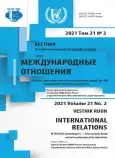Implementation of SDG 16: Russia’s Role and Actions
- Autores: Ignatov A.A.1
-
Afiliações:
- RANEPA
- Edição: Volume 21, Nº 2 (2021): Intensifying U.S. — Сhina Strategic Rivalry and the Transformation of the Global Order
- Páginas: 372-387
- Seção: PEACE AND SECURITY
- URL: https://journal-vniispk.ru/2313-0660/article/view/320320
- DOI: https://doi.org/10.22363/2313-0660-2021-21-2-372-387
- ID: 320320
Citar
Texto integral
Resumo
Sustainable Development Goal (SDG) 16 ‘Peace, Justice and Strong Institutions’ is one of 17 SDGs identified by the UN in 2015. The SDGs that supersede the Millennium Development Goals imply continuous multilateral actions to ensure their full and timely implementation. Analysis of the available literature shows that insufficient attention is paid to the international component of SDG implementation. An insufficient examination of Russia’s participation in international initiatives to implement the SDGs, and SDG 16 in particular, is also noted. This article intends to fill in this gap by presenting the results of an analysis of Russia’s activities in the international arena, contributing to the implementation of SDG 16. Russia today is one of the key actors in international politics. Russia’s activities in the international arena, including its participation in multilateral programs of assistance to countries and regions experiencing difficulties in resolving internal conflicts, contribute to the implementation of SDG 16. However, this aspect is not covered in Russia’s Voluntary National Review for the High-Level Political Forum, nor in available research. The author examines the features of a modern approach to studying the international aspect of the SDG’s implementation. Furthermore, the author analyzes Russia’s activities on the international arena contributing to SDG 16 implementation. The article concludes with the author’s observations regarding appropriate steps to increase Russia’s contribution to SDG 16 implementation.
Sobre autores
Alexander Ignatov
RANEPA
Autor responsável pela correspondência
Email: ignatov-aa@ranepa.ru
ORCID ID: 0000-0001-6740-4454
Researcher, Center for International Institutions Research (CIIR)
Moscow, Russian FederationBibliografia
- Ali, S., Hussain, T., Zhang, G., Nurunnabi, M., & Li, B. (2018). The implementation of Sustainable Development Goals in “BRICS” countries. Sustainability (Switzerland), 10(7), 1—14. https://doi.org/10.3390/su10072513
- Barbier, E.B., & Burgess, J.C. (2020). Sustainability and development after COVID-19. World Development, 135, 1—4. https://doi.org/10.1016/j.worlddev.2020.105082
- Barua, S. (2020). Financing Sustainable Development Goals: A review of challenges and mitigation strategies. Business Strategy and Development, 3(3), 277—293. https://doi.org/10.1002/bsd2.94
- Bratersky, M.V. (2018). Russia and peacekeeping operations: Conceptual and practical components of Russia’s policy. International Organisations Research Journal, 13(1), 157—170. (In Russian and English). https://doi.org/10.17323/1996-7845-2018-01-09
- Cernev, T., & Fenner, R. (2020). The importance of achieving foundational Sustainable Development Goals in reducing global risk. Futures, 115, 1—12. https://doi.org/10.1016/j.futures.2019.102492
- El Baradei, L. (2019). Politics of evidence based policy making: Reporting on SDG 16 in Egypt. International Journal of Public Administration, 43(5), 425—440. https://doi.org/10.1080/01900692.2019.1668414
- Gates, S., Hegre, H., Nygård, H.M., & Strand, H. (2012). Development consequences of armed conflict. World Development, 40(9), 1713—1722. https://doi.org/10.1016/j.worlddev.2012.04.031
- Hope, K.R. Sr. (2020). Peace, justice and inclusive institutions: Overcoming challenges to the implementation of Sustainable Development Goal 16. Global Change, Peace and Security, 32(1), 57—77. https://doi.org/10.1080/14781158.2019.1667320
- Kelly, W.E., & Henry, W.P. (2019). Anti-corruption, ethics, sustainable infrastructure, and the UN Sustainable Development Goals. International Conference on Sustainable Infrastructure 2019: Leading Resilient Communities through the 21st Century: Proceedings of the International Conference on Sustainable Infrastructure 2019, 626—633. https://doi.org/10.1061/9780784482650.067
- Klinsky, S., & Golub, A. (2016). Justice and sustainability. In H. Heinrichs, P. Martens, G. Michelsen & A. Wiek (Eds.), Sustainability science (pp. 161—173). Dordrecht, Netherlands: Springer.
- Kolmar, O.I, & Sakharov, A.G. (2019). Prospects of implementation of the UN SDG in Russia. International Organisations Research Journal, 14(1), 189—206. (In Russian and English). https://doi.org/10.17323/1996-7845-2019-01-11
- Lagoarde-Segot, T. (2020). Financing the Sustainable Development Goals. Sustainability, 12(7), 1—22. https://doi.org/10.3390/su12072775
- Lanshina, T.A., Barinova, V.A., Loginova, A.D., Lavrovsky, E.P., & Ponedelnik, I.V. (2019). Localizing and achieving the Sustainable Development Goals at the national level: Cases of leadership. International Organisations Research Journal, 14(1), 207—224. (In Russian and English). https://doi.org/10.17323/1996-7845-201901-12
- Larionova, M.V. (2020). The challenges of attaining the Millennium Development Goals (MDGs). International Organisations Research Journal, 15(1), 155—176. (In Russian and English). https://doi.org/10.17323/1996-7845-2020-01-07
- Larionova, M.V., Ignatov, A.A., Popova, I.M., Sakharov, A.G., & Shelepov, A.V. (2020). BRICS at Ten: The Way Forward. Moscow: Izdatel’skij dom “Delo” RANHiGS publ. (In Russian).
- Muratbekova, A. (2019). Exploring the Shanghai Cooperation Organisation’s identity crisis: What is next? International Organisations Research Journal, 14(4), 138—160. (In Russian and English).
- Nygård, H.M. (2017). Achieving the sustainable development agenda: The governance — conflict nexus. International Area Studies Review, 20(1), 3—18. https://doi.org/10.1177/2233865916683609
- Satterthwaite, M., & Dhital, S. (2019). Measuring access to justice: Transformation and technicality is SDG 16.3. Global Policy, 10(S1), 96—109. https://doi.org/10.1111/1758-5899.12597
- Takian, A., & Rajaeieh, G. (2020). Peace, health, and sustainable development in the Middle East. Archives of Iranian Medicine, 23(4), 23—26. https://doi.org/10.34172/AIM.2020.S5
Arquivos suplementares









